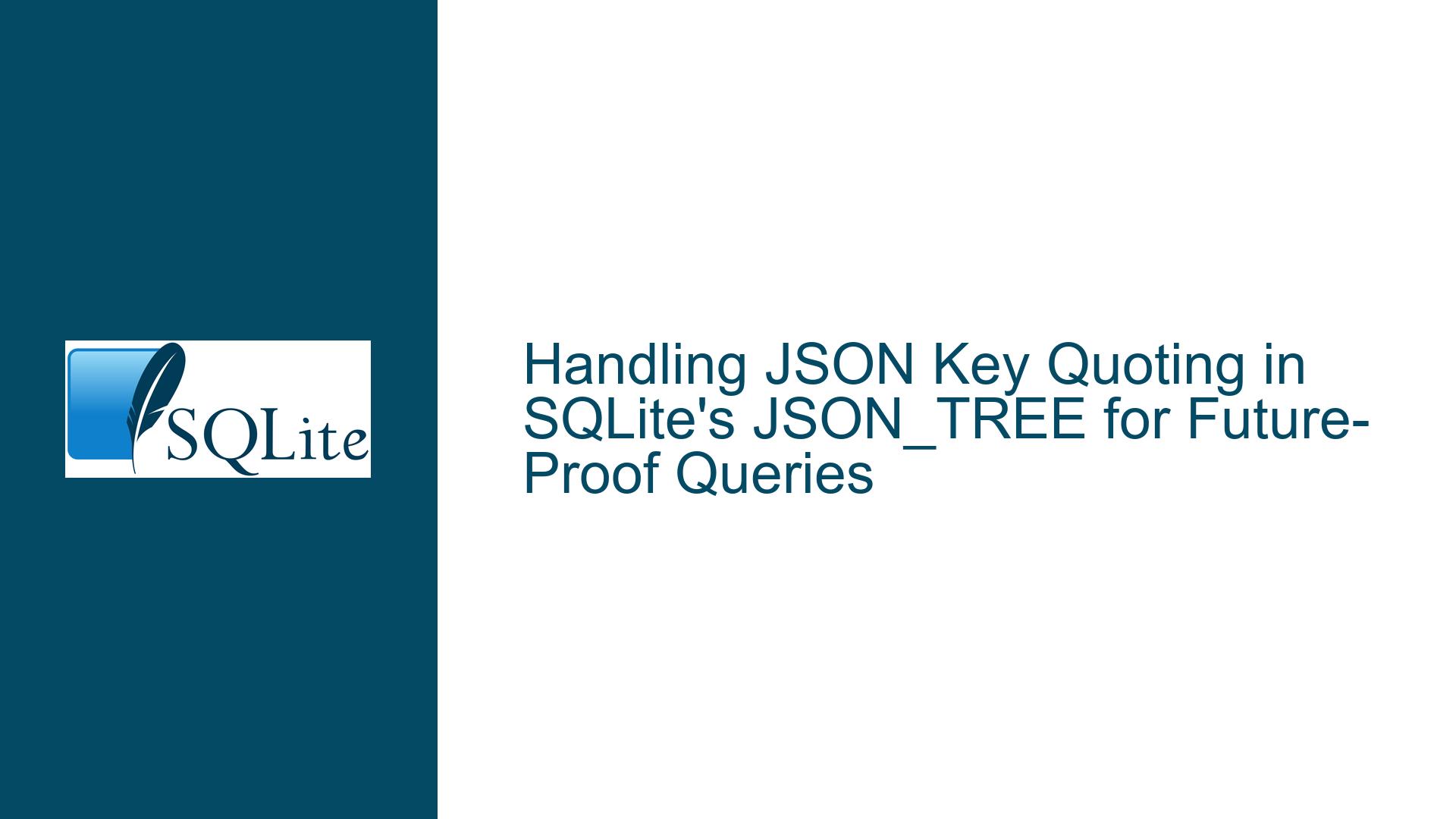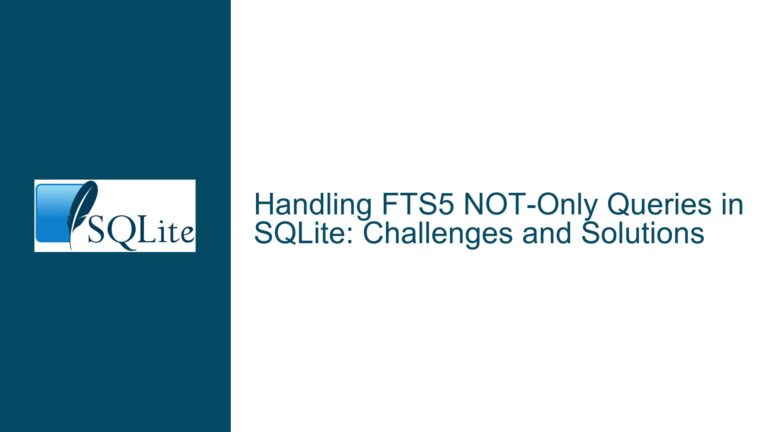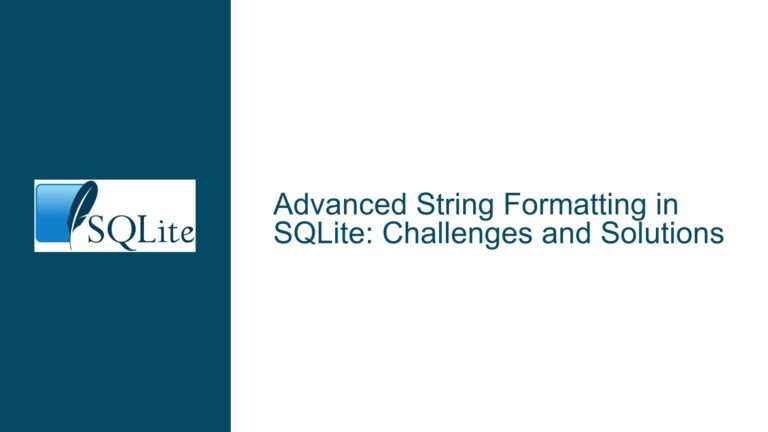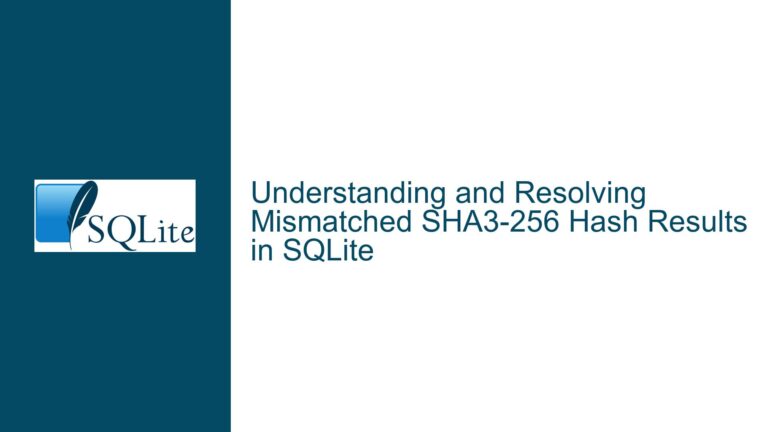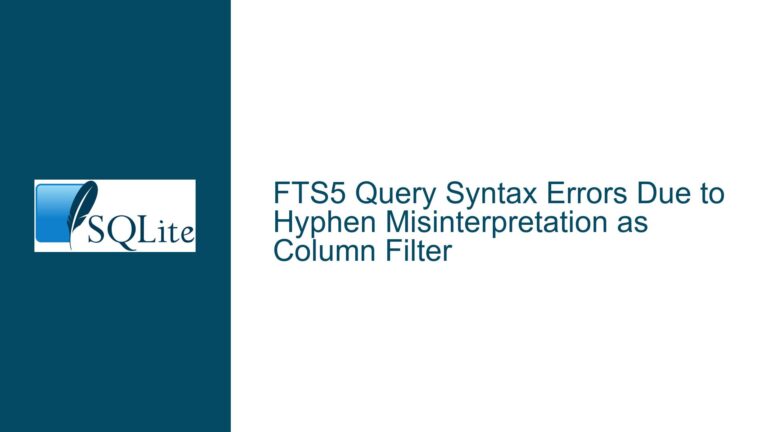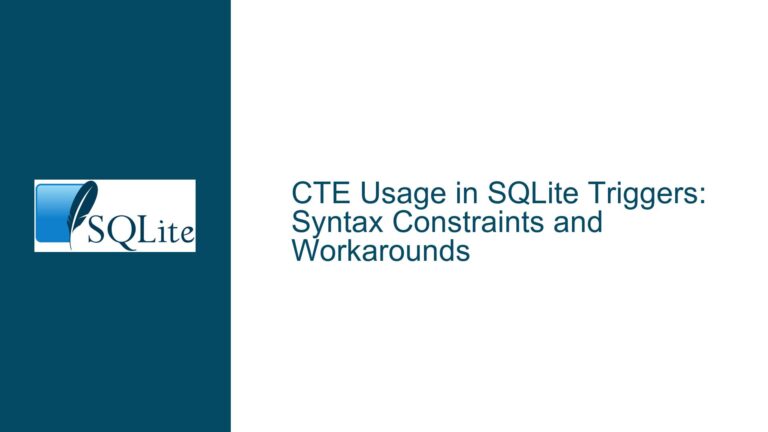Handling JSON Key Quoting in SQLite’s JSON_TREE for Future-Proof Queries
Understanding JSON Key Quoting in JSON_TREE and JSON_EXTRACT
When working with JSON data in SQLite, particularly with functions like JSON_TREE and JSON_EXTRACT, understanding how JSON keys are quoted is crucial for writing robust and future-proof queries. The issue at hand revolves around the inconsistent quoting of JSON keys in the fullkey and path columns of the JSON_TREE function, compared to the key column and the JSON_EXTRACT function. This inconsistency can lead to unexpected behavior in queries, especially when comparing or filtering based on these keys.
In the provided example, the JSON object {"a":1,"b_u":23,"c_u":{"d":56,"e_u":7}} is parsed using JSON_TREE, and the resulting table shows that keys containing underscores (e.g., b_u, c_u, e_u) are quoted in the fullkey and path columns, while the key column remains unquoted. This discrepancy can cause queries that rely on string comparisons to fail if they do not account for the presence of quotes.
For instance, the query select * from tree where fullkey = '$.c_u'; returns an empty result because the fullkey column contains the quoted key $."c_u". To retrieve the correct result, the query must explicitly include the quotes: select * from tree where fullkey = '$."c_u"';. Alternatively, one could use the replace function to strip the quotes before comparison: select * from tree where replace(fullkey,'"','') = '$.c_u';.
This behavior raises important questions about how to write SQL queries that are resilient to potential changes in how JSON keys are quoted in future versions of SQLite. The goal is to ensure that your code continues to function correctly even if the quoting conventions evolve.
Potential Causes of JSON Key Quoting Inconsistencies
The inconsistency in JSON key quoting between JSON_TREE and JSON_EXTRACT can be attributed to several factors. First, the JSON_TREE function is designed to provide a detailed breakdown of the JSON structure, including the full path to each element. This path is represented in a way that is both human-readable and unambiguous, which often necessitates quoting keys that contain special characters or underscores. The fullkey and path columns in JSON_TREE are intended to be used in contexts where the exact JSON path is important, such as when reconstructing the JSON structure or navigating through nested objects.
On the other hand, JSON_EXTRACT is focused on retrieving specific values from a JSON object based on a given path. The path syntax in JSON_EXTRACT is more lenient, allowing for unquoted keys in many cases, especially when the keys are simple and do not contain special characters. This leniency can lead to discrepancies when comparing paths generated by JSON_TREE with those used in JSON_EXTRACT.
Another potential cause of this inconsistency is the evolution of the SQLite JSON functions themselves. As SQLite continues to develop, the handling of JSON data may change to accommodate new features or improve performance. These changes could include adjustments to how JSON keys are quoted in various contexts. While such changes are typically made with backward compatibility in mind, they can still introduce subtle differences that affect existing queries.
Finally, the inconsistency may also stem from the way JSON paths are internally represented and processed within SQLite. The JSON_TREE function generates a detailed tree structure that includes metadata about each JSON element, such as its type, value, and position within the hierarchy. This metadata is used to construct the fullkey and path columns, which may require quoting to ensure that the paths are correctly interpreted. In contrast, JSON_EXTRACT operates on a simpler level, extracting values directly based on the provided path without the need for detailed metadata.
Best Practices for Writing Resilient Queries with JSON_TREE
To write SQL queries that are resilient to potential changes in JSON key quoting, it is important to adopt a set of best practices that account for the current behavior of JSON_TREE and JSON_EXTRACT while also anticipating future changes. These practices include:
1. Consistent Key Naming Conventions: One of the simplest ways to avoid issues with JSON key quoting is to adopt a consistent naming convention for JSON keys. By sticking to alphanumeric characters and avoiding special characters or underscores, you can minimize the need for quoting in the first place. For example, instead of using keys like b_u or c_u, consider using bU or cU to adhere to a more standardized naming convention. This approach reduces the likelihood of encountering quoting issues in both JSON_TREE and JSON_EXTRACT.
2. Normalizing JSON Paths: When working with JSON paths in JSON_TREE, it is often necessary to normalize the paths to ensure consistent comparisons. This can be achieved by stripping quotes from the fullkey and path columns before performing any comparisons. For example, instead of writing select * from tree where fullkey = '$."c_u"';, you could use select * from tree where replace(fullkey,'"','') = '$.c_u';. This approach ensures that your queries are not dependent on the presence or absence of quotes in the JSON paths.
3. Using Parameterized Queries: Parameterized queries can help mitigate the impact of changes in JSON key quoting by allowing you to dynamically construct JSON paths based on the current behavior of JSON_TREE. For example, you could define a parameter that holds the JSON path and then use this parameter in your queries. This approach makes it easier to adapt your queries if the quoting conventions change in the future. For instance, you could use .param set :json_path '$."c_u"' and then write select * from tree where fullkey = :json_path;. This way, if the quoting conventions change, you only need to update the parameter definition rather than modifying multiple queries.
4. Leveraging SQLite’s JSON Functions: SQLite provides a range of JSON functions that can be used to manipulate and query JSON data. By leveraging these functions, you can write more robust queries that are less dependent on the specific quoting conventions of JSON_TREE. For example, you could use json_extract to retrieve values from a JSON object and then use json_tree to navigate through the JSON structure. This combination allows you to take advantage of the strengths of both functions while minimizing the impact of any inconsistencies in key quoting.
5. Testing and Validation: Finally, it is essential to thoroughly test and validate your queries to ensure that they behave as expected under different scenarios. This includes testing with various JSON structures, key naming conventions, and quoting styles. By doing so, you can identify any potential issues early on and make the necessary adjustments to your queries. Additionally, keeping up-to-date with the latest developments in SQLite and its JSON functions can help you stay informed about any changes that may affect your queries.
In conclusion, while the inconsistency in JSON key quoting between JSON_TREE and JSON_EXTRACT can pose challenges, adopting a set of best practices can help you write resilient queries that are less susceptible to future changes. By focusing on consistent key naming conventions, normalizing JSON paths, using parameterized queries, leveraging SQLite’s JSON functions, and thoroughly testing your queries, you can ensure that your code remains robust and maintainable in the face of evolving JSON handling in SQLite.
